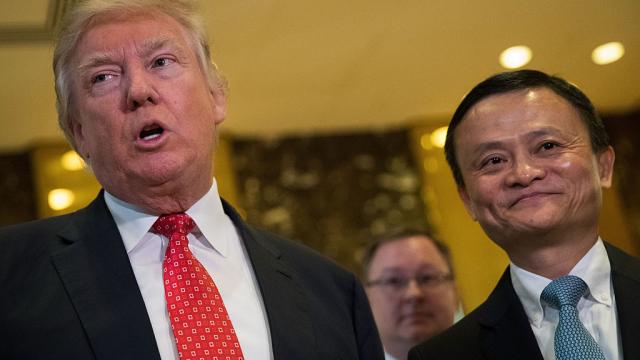Jack Ma, the billionaire businessman and chairman of the Alibaba Group, believes that automation will help workers of the future enjoy more leisure time. In fact, he sees a future where people will be working just 16 hours per week by 2047.
Donald Trump and Jack Ma, Chairman of Alibaba Group, speak to reporters following their meeting at Trump Tower, January 9, 2017 in New York City (Photo by Drew Angerer/Getty Images)
“I think in the next 30 years, people only work four hours a day and maybe four days a week,” Ma said this week at a conference in Detroit. “My grandfather worked 16 hours a day in the farmland and [thought he was] very busy. We work eight hours, five days a week and think we are very busy.”
Does that sound familiar? It might, if you’ve heard other predictions for the future of work from the 20th century. In fact, the 16-hour work week was a tremendously popular prediction in the 1960s. Back then, of course, experts said it would arrive by that magical year 2000.
Or, if you were a pessimist, you believed that we’d only cut back to 30-hour work weeks by 2000. Other pessimists of the 20th century believed that we wouldn’t achieve a 16-hour work week until the distant year 2020.
As Walter Cronkite proclaimed in 1967:
Technology is opening a new world of leisure time. One government report projects that by the year 2000, the United States will have a 30-hour work week and month-long vacations as the rule.
None of this has happened. Under capitalism, workers will never get shorter work weeks or more leisure time, because increased productivity only leads to higher profits for companies, not better wages for workers. That is, unless those workers ask for it through some form of collective bargaining agreement obtained through a union.
Taking the US as an example, the American worker today is roughly 25 per cent more productive today than she was in the year 2000, and yet inflation-adjusted wages haven’t budged. Some people are indeed working just 30 hours per week, just not through any choice of their own. While the American economy is at what economists consider full employment, underemployment continues to be a major issue and wages are stagnant compared to growth in productivity over the past half-century.
Now don’t get me wrong, 16-hour work weeks are possible in the future. But they’re not realistic under a capitalist system. For a 16-hour work week to be sustainable we’d need nothing short of full communism. And I have a feeling Jack Ma isn’t advocating for that.
[CNBC]
